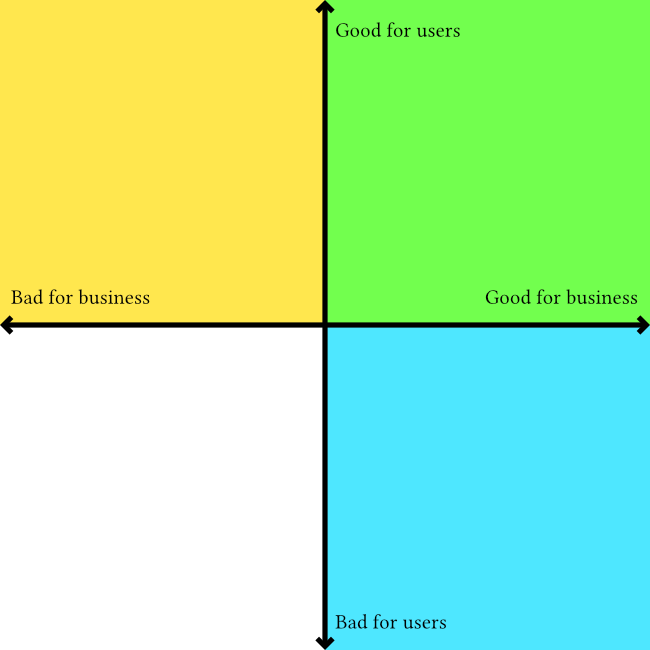Feedback types: Is this a thing? / challenging perspectives / general opinions
Here’s an outline which I originally posted as a tweet thread but would like to flesh out into a fill article with images like the attached one to illustrate the “zones” that people may/may not realise they are acting in when they say stuff like “what’s good for the user is good for the business”
I am writing this because I’ve published a few things now which say that empathy and “human centeredness” in commercial design, particularly UX design/research, are theatrical and not compatible with capitalism if done deliberately. That means they can be true as a side-effect, or by individuals acting under the radar of their employers. It has become common to hear the good for the user = good for the business response - and I want to write something that demonstrates how it is an incomplete sentence, and any way to add the necessary information to make it true results in the speaker admitting they are not acting in the interests of users or humans.
Here’s the basic outline so far:
What’s good for the User
“What’s good for the user is good for the business” is a common response I get to my UX critique. When I try to understand the thinking behind that response I come up with two possible conclusions:
Conclusion 1: They are ignoring the underlying product and speaking exclusively about the things between the product and a person. They are saying that making anything easy to use, intuitive, pleasant, makes a happy user and a happy user is good for business.
This type of “good for the user” is a business interest that values engagement over ethics. It justifies one-click purchases of crypto shitcoins, free drinks at a casino, and self-lighting cigarettes. https://patents.google.com/patent/US1327139
Conclusion 2: They are speaking exclusively about the underlying product and the purposes it was created to serve. They say a good product will benefit the business. But this means they are making a judgement call on what makes a product “good”.
This type of “good for the user” is complicated because it is a combination of objective and subjective consideration of each product individually. It is design in its least reductive form because the creation of something good is the same with or without business interests. A designer shouldn’t use blanket statements agnostic to the design subject. “what is good for the user…” ignores cigarette packet health warnings and poker machine helpline stickers there because of enforced regulation, not because of a business paying designers to create them.
It’s about being aware of the context, intent, and whose interests are being served. It means cutting implied empathy for people if it is bullshit.
If we look at this cartesian plane diagram we can see the blue and green quadrants that corporate product design operates in. The green being where the “good for user, good for business” idea exists, and the yellow representing the area that the idea ignores, dismisses, etc



GDPR did a number on what little faith I have in business ethics. I wasn’t surprised that adtech, having its business model made all but illegal if the spirit and letter of the law were followed, would need to be dragged to compliance by force, kicking and screaming all the way. I did not expect half the goddamn internet to engage in a zerg rush of violations to overwhelm already underenthusiastic regulatory bodies and spread FUD.
I’ve read through the entirety of GDPR and its accompanying recitals in two languages. It’s some of the most carefully considered and reasonable legal text I’ve ever digested. It goes through meticulous trouble to allow processing personal data for purposes where it’s technically necessary (e.g. cookies for logging in users of storing contents of a shopping cart), legally or contractually necessary (recording the place of residence for members of a club or shipping address for a purchased item), in the legitimate interests of either party provided it doesn’t infringe on the rights of the subject otherwise (e.g. access logs of a web server for the express purpose of security forensics). All of these without ever asking for any permissions, just a list item in an easily accessible privacy policy page.
A business should almost never have to ask its user for their consent to process their personal data, because the other lawful purposes cover just about everything you’d want a business to do for you. If you need to give permission for more, it’s almost certainly being used to show ads to you, being sold to someone who shows ads to you, being sold to someone so they can adjust your social credit, or at best to make you an unpaid beta tester. And because everyone uses Google fucking Analytics, it’s also being used to show ads to you.
Even so, everyone asks you to sell your soul anyway, because everyone uses Google Analticks and people who program websites for a living think reprogramming a website to not use Google Analticks is hard. And in some cases their business model is selling your personal information to Google for a pittance and they want to pretend their business model deserves to exist. Incompetence is indistinguishable from malice here, and that means you can try and keep dragging your feet until people maybe forget there ever was a reason why sites ask for cookie permission.
Analytics don’t even work to make websites better. How do I know? Because websites keep getting worse. Whatever improvements may come from tracking my usage (as if), enshittification dwarfs it all. This all ties back into what you said about UX. I’ve seen hackernews go “oh I always opt in to tracking because they use that to improve the website”. Charitably assuming genuine ignorance instead of malicious astroturfing, I now have a response to them. If those analytics are used to improve the site at all, they’re optimizing for the business, not for the user. And those interests are, more often than not, cross-aligned.
Sorry about the rant, I hope it wasn’t too off topic to maybe give some ideas for this or some future article.
I’ve felt all of this in my bones for the longest time without the words to describe why. I keep seeing hacker news types act like these cookie permission prompts were forced on them by “bumbling EU politicians” and thinking no, this shit was all you assholes trying to defang a good set of policies that rightfully threaten ad profits (because it’s a fucking busted model for web content)
this is so much like seeing an advertiser claim that most people like ads and blocking them is immoral. takes so bad it’s like the poster’s a space alien failing to pose as human
Imagine a door-to-door salesman who sees a “no soliciting” sign and goes ahead with his thing anyway. He starts his sales pitch with “Can I interest you in…” and thinks he’s being clever since in his mind that’s technically asking for a special permission for soliciting. And of course, “no” isn’t considered a final answer until the door has been slammed in his face.
That’s what the cookie banners are.
this is legitimately how the door to door sales people in my area are too. sales never fucking changes